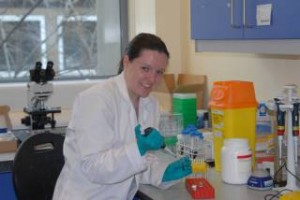Doctors, engineers, scientists, clinicians and ambulance paramedics are working together on a National Instititue for Health Research (NIHR) funded project which could shave off vital time between patient assessment, diagnosis and treatment for those with suspected heart attacks, and give earlier ... READ MORE
Universal flu vaccine developed in Oxford
Scientists at Oxford University have successfully tested a universal flu vaccine that could work against all known strains of the illness, taking a significant step in the fight against a disease that affects billions of people each year. The treatment – using a new technique and tested for the ... READ MORE
Maternal stroke history linked to Myocardial Infarction risk in women
Women whose mothers had a stroke are at increased risk for both stroke and myocardial infarction, new research has shown. In a study of sex-of-parent and sex-of-proband interactions for family history of stroke in acute coronary syndrome (ACS) patients, Amitava Banerjee of the University of ... READ MORE
The Alois community project – volunteering opportunity
The Cochrane Dementia and Cognitive Improvement Group, based at the JR Hospital, is running a volunteer recruitment campaign in conjunction with the development of a free online course “Making Sense of the Evidence in Dementia”, primarily aimed at caregivers and former caregivers of people with ... READ MORE
ARCII-study in Oxford – the human face of medical breakthrough
Last December, Kevin Jones, a 43-year-old businessman from Dorset was diagnosed with pancreatic cancer. It was advanced and inoperable. Today, as he prepares to celebrate Christmas with his son, Mr Jones is free from any detectable trace of the disease; the human face of a medical breakthrough so ... READ MORE
An aspirin a day helps to keep cancer at bay
Taking a low-dose aspirin every day will reduce your chances of dying from cancer, scientists say today, confirming the over-the-counter pill as the most extraordinary drug yet discovered. Daily aspirin has already been shown to cut the chances of heart attacks and stroke in people who are at ... READ MORE
Who’s the best surgeon for unblocking your arteries?
A Daily Mail article (23.11.10) features the country's top heart doctors, as recommended by their peers. Two of the best doctors (Adrian Banning and Bernard Prendergast) come from Oxford, read more. ... READ MORE
New retinal implant technique is being trialled in Oxford
A new retinal implant technique is being trialled at the Oxford Eye Hospital in 2011 for the first time in the UK. Professor Robert MacLaren, Consultant Retinal Surgeon at the Oxford Eye Hospital, is leading a trial to look at new technology that aims to restore sight to blind patients. By ... READ MORE
Aspirin ‘can significantly reduce’ bowel cancer risk
Professor Peter Rothwell, of the John Radcliffe Hospital, Oxford, and Oxford University, describes the findings of a recent study, tipping the balance in favour of regular aspirin ... READ MORE
Clinical trials begin of new treatment for advanced Melanoma in the UK & USA
Researchers at Immunocore Limited today announced that IMCgp100, a targeted therapeutic for the treatment of advanced metastatic melanoma, has received regulatory and ethics approval and has opened enrolment for clinical trials in the England and USA. IMCgp100 is the first clinical candidate ... READ MORE
World Alzheimer’s Day – 21st September
With dementia affecting 750,000 people in the UK it has become a topic of great interest receiving recognition in government strategies, media campaigns and new research. Dementia is becoming more common and many of our lives are affected by the condition; 25 million people in the UK know a close ... READ MORE
NHS laboratory to pilot next-generation genetic sequencing
Dr Andrea Nemeth, Consultant Clinical Geneticist and Honorary Senior Lecturer at Oxford's Churchill Hospital and the University of Oxford, is part of a team that is currently testing two next-generation sequencing platforms - the Roche 454 and Illumina systems - for use in a hospital ... READ MORE
Expert joins Experimental Neurology Team
Peter Brown has recently been appointed as Professor of Experimental Neurology, Department of Clinical Neurology and as an Honorary Consultant Neurologist within the Oxford Radcliffe Hospitals NHS Trust. Professor Brown was attracted from UCL in London to Oxford by the range and volume of ... READ MORE
Preventing strokes research
Two projects led by Professor Peter Rothwell, from the Department of Clinical Neurology, University of Oxford, are leading to major improvements in the effectiveness of stroke prevention. Results from the study (named EXPRESS) indicated that urgent use of existing treatments (including ... READ MORE
Swine flu clinical trial results published
Last autumn the Oxford Vaccine Group was the lead site on a novel influenza H1N1 (‘Swine Flu’) vaccine study that enrolled over 900 children in 5 weeks. This rapid recruitment enabled us to provide data to the Department of Health in time to directly inform the national ‘Swine Flu’ immunisation ... READ MORE
Scientists look for examples of people’s writing for new Alzheimer’s study
Scientists at the Universities of Oxford, Southampton and St George’s, University of London are asking people with and without Alzheimer’s disease to come forward with examples of their writing as part of a study to identify changes in language use that occur with the condition. ‘We’re ... READ MORE
Variable blood pressure a new stroke risk factor?
Three recent papers recently published in The Lancet, and a further study in The Lancet Neurology, show that it is variability in patients’ blood pressure that is more likely to predict the risk of a stroke than a high average or usual blood pressure level. The results of the studies, led by ... READ MORE
mHealth: mobile technology for 21st century healthcare
Professor Lionel Tarassenko is the theme leader for the Bioengineering, Innovation & Technology research theme at the Oxford Biomedical Research Centre. On Feb 22 he gave a talk hosted by the Royal Academy of Engineering on how mobile technology is being used in modern healthcare ... READ MORE
New method makes vaccines stable at tropical temperatures
A simple and cheap way of making vaccines stable – even at tropical temperatures – has been developed by scientists at Oxford University and Nova Bio-Pharma Technologies. The British technology has the potential to revolutionise vaccination efforts, particularly in the developing world where ... READ MORE
Tumour mapping for novel cancer treatment in Oxford
Professor Mark Middleton, Professor John Bell, Dr Jenny Taylor and research colleagues from Oxford were interviewed on BBC Radio 4 on 17 February about new generations of cancer drugs. Discussions centred around advances in tumour mapping, patients' experiences, advances in genetic testing and ... READ MORE

